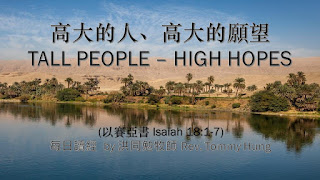讀經: 賽十八1~7
SCRIPTURE READING: Isaiah 18:1-7
釋義: 舊約時代的埃及是由南北兩國組成: 北國在地中海南岸, 尼羅 河下游的地方, 稱為埃及, 即今日的埃及; 南國是尼羅河上游。「古實河」包括了流經現今蘇丹與巴卡、奧亙斯、里比謝比利
(Barka, Awash, Redi Shebeli)的藍、白尼羅河, 及流經現今埃塞俄比亞與索馬利亞的其他河流, 聖經稱為埃提阿伯的古實,涵蓋的面積較現今埃賽塞俄比亞為大。本章以古實稱呼埃及國, 因為在以賽亞時代,埃及是受古實人統治,而這點反映在二十章中,那裡埃及與古實是記載於同一句中。
INSIGHT: Egypt in the Old Testament era was divided
into the northern and southern kingdoms: The northern kingdom was the land along the
south coast of the Mediterranean Sea in the lower reaches of the Nile known as
Egypt, or the present-day Egypt; the southern kingdom was in the upper reaches
of the Nile. “The rivers of Cush” include
the White and Blue Nile that flow through the present-day Sudan, Barka, Awash, and
Redi Shebeli, and the other rivers that flow through present-day Ethiopia and Somalia.
Cush, called Ethiopia in the Bible,
covered an area larger than today’s Ethiopia.
In this chapter, Egypt is called Cush because in Isaiah’s times, Egypt
was ruled by the people of Cush; this is reflected in chapter 20 where Egypt
and Cush are recorded in the same sentence.
先知重複稱讚古實人高大(2,7), 毫不誇張。主前五世紀希臘的希羅多德(Herodotus)描寫他們為「人中之最高大俊美者」。 即然如此, 這些偉人怎樣也不能與創造偉人的神相比。第四節是以賽亞書最美麗而有力的神諭之一。最重要的是它指出了人間一切的喧嚷混亂,神都在默然觀看,這是對上帝信心的表現。
The prophet praises the people of Cush repeatedly
for being tall (2, 7), with no exaggeration at all. In the 5th century BC, Herodotus of Greece
described them as “the tallest and most handsome among men”. Despite that,
these great people cannot compare to God who creates great people. Verse 4 is one of the most beautiful and
powerful oracles in the Book of Isaiah; the most important thing is that it points
out that in the midst of all the rowdiness and chaos on earth, God is quietly
looking; this mentality is a display of faith in God.
神的「居所」, 不論是耶路撒冷的聖殿,或是天上(參六1),都是穩如泰山,無法搖動。「清熱」與「露水的雲霧」是十分突出的形像。前者具有視覺效果,把連微風也不能攪擾的清晰寧靜的酷熱暑天,來比作全能者的穩定,在祂的榮耀中,作為這個迷惘而困擾的世界的光明與平安的來源。第二個形像化的露水,可能是較為觸覺性,正如在酷熱下,經過一天辛勞工作,清涼的晚風使人感到清新與甦醒,同樣地神的智慧,透過祂僕人眾先知的傳講,使有需要者獲得力量與勇氣。
God’s “dwelling”, whether it’s the temple in
Jerusalem or in heaven (refer to 6:1), is secure and unshakable. “Clear heat” and “a cloud of dew in the heat
of harvest” are very prominent images. The
former possesses visual effects - a clear and quiet scorching summer day,
undisturbed even by light breezes, analogizing the Almighty’s immutability; His
glory is a source of light and peace in this confusing and disturbing world. The second visualization, the dew, is perhaps
more tactile; after a day of toiling work in scorching heat, a cool evening
breeze refreshes and restores. Likewise,
God’s wisdom, through the preaching of his servants and the prophets, gives strength
and courage to those in need.
耶和華的奇妙, 就是祂的偉大不單臨到選民, 也期望甚至受責罰的古實人都能認識和經歷。本章預言用首尾呼應的格式, 表達了神這個心願。開始時差遣快行的使者「要到高大光滑的民那裡去。自從開國以來,那民極其可畏,是分地界踐踏人的;他們的地有江河分開」(2),
目的在最後一節: 期望「他們必將禮物奉給萬軍之耶和華,就是奉到錫安山─耶和華安置他名的地方。」(7)
The Lord’s wonderfulness, or His greatness, is
not limited to the chosen people. The hope is that even the punished people of
Cush could understand and experience it. This chapter employs the echo
technique to express God’s desire. At
the beginning, swift messengers are sent “to a nation tall and smooth, to
a people feared near and far, a nation mighty and conquering, whose land
the rivers divide” (2); the purpose is in the last verse – hoping that “At that time tribute will be brought to
the LORD of hosts from a people tall and smooth, from a people
feared near and far, a nation mighty and conquering, whose land the rivers divide,
to Mount Zion, the place of the name of the LORD of hosts.”
(7)
耶穌吩咐信徒要愛敵人如己。這不是一個口號; 這是神的心願。如果神對敵人古實尚且發出接納他們悔改敬拜的呼求,
我們今天可否向「仇敵」伸出友誼的手, 與他們復和? 打電話給他們? 寫張便條或心意卡表達在主裡的接納?
Jesus
commands believers to love our enemies as ourselves. This is not a catchphrase;
it is God’s desire. If God even accepts
the cry of repentance and worship from the people of Cush, his enemy, shouldn’t
we extend a hand of friendship to our “enemies”, and make amends with them? Call them? Write a note or a thinking-of-you card to express
our acceptance of them in Christ?
每日讀經 by 洪同勉牧師 Rev. Tommy Hung

No comments:
Post a Comment